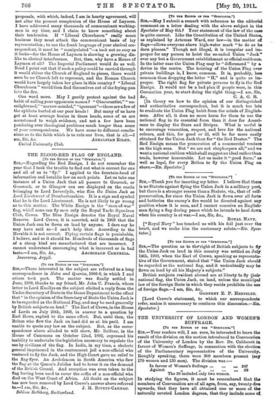[To THE EDITOR OF THE " SPECTATOR."]
SIR,—Those interested in the subject are referred to a long correspondence in Notes and Queries, 1906-8, in which I and others took part. The matter was finally settled in June, 1908, thanks to my friend, Mr. John C. Francis, whose letter to Lord Knollys on the subject elicited a reply from the Under-Secretary of State in the Home Department to the effect that " in the opinion of the Secretary of State the Union Jack is to be regarded as the National Flag, and may be used generally by British subjects on land." The Earl of Crewe, in the House of Lords on July 20th, 1908, in answer to a question by Earl Howe, replied to the same effect. But, until then, the Briton who flew the Jack on land did so at his peril. I am unable to quote any law on the subject. But, as the corre- spondence above alluded to will show, Mr. Balfour, in the House of Commons on October 22nd, 1892, expressed his inability to undertake the legislation necessary to regulate the use by civilians of the flag. In India, in my time, a choleric general imprisoned in the cantonment jail a non-official who ventured to fly the Jack, and the High Court gave no relief to the flag-flyer. An Archdeacon in South America who flew the flag at the Queen's Jubilee had to lower it on the demand of the British Consul. And exception was even taken to the flag having been used to cover the coffin of a non-official who died on the West Coast of Africa. All doubt on the subject has now been removed by Lord Crewe's answer above referred to.—I am, Sir, Sze., J. H. RIVETT-CARNAC. Schloss Rothberg, Switzerland.








































 Previous page
Previous page